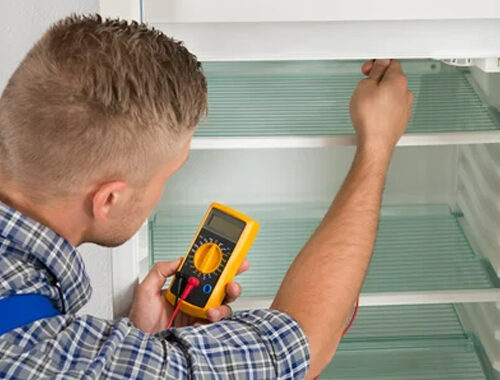Are you wondering if it’s time to repair or replace your old refrigerator? The average lifespan of a fridge is about 14 years, so if yours is getting close to that age, you should start looking into what’s best for your situation. As an expert on refrigerator repair and replacement, I’m here to help guide you through the process. In this article, we’ll take a look at some key points to consider when deciding whether to fix up your existing unit or invest in something new. From cost comparisons to energy efficiency, I’ll provide all the information you need so that you can make an informed decision with confidence. Read on and let’s get started!
Definition Of An Old Refrigerator
When it comes to refrigerators, age is an important factor in determining whether repair or replacement is the best option. But what exactly constitutes an old refrigerator? Generally speaking, a refrigerator should be considered old when its age exceeds 10 years. This applies not only to the fridge itself but also to any of its components such as compressors and condensers. So if you’re considering repairing or replacing your existing appliance, it pays to first determine how long it’s been in use.
The exact age definition for a refrigerator will vary depending on the brand and model. Some fridges simply last longer than others due to better construction materials and design features. If possible, try to get a general idea of how many years your particular unit has been working by checking online reviews or asking around at local stores that sell appliances like yours.
In addition, make sure to inspect all parts carefully before making a decision about whether repair or replacement is necessary. Check for signs of corrosion or other wear-and-tear that could indicate an aging system requiring attention sooner rather than later; otherwise, you may end up dealing with costly repairs down the road! With this information in hand, we can now move on to discussing the benefits of repairing an old refrigerator..

Benefits Of Repairing An Old Refrigerator
“You can’t judge a book by its cover”, is an adage that holds true for the decision to repair or replace your old refrigerator. When it comes down to making this important choice, there are several benefits of repairing your existing appliance instead of buying a new one.
The cost associated with fixing an old fridge is comparatively much lower than purchasing and installing a brand-new unit in most cases. In addition, troubleshooting any issues related to repairs also helps you become better acquainted with the functioning of your refrigerator and identify potential problems before they get worse.
The life span of your aging refrigerator can be extended through regular maintenance and careful monitoring of the machine’s performance. This will help ensure the safety of all food items stored inside as well as keep energy costs low over time due to efficient operation.
Understanding how often certain parts need replacing or servicing can save you money in the long run since many components contain small amounts of hazardous materials that must be disposed of off properly when replaced.
In short, not only does choose to repair an older model offer economic advantages but it may even extend the lifespan of your appliance while taking necessary precautions for safe usage. By understanding the pros and cons involved in both options, you can make an informed decision about whether you should repair or replace your old refrigerator.
Disadvantages Of Repairing An Old Refrigerator
When it comes to repairing an old refrigerator, there are a few potential drawbacks that should be considered. One of the main disadvantages is costly repairs. With older models, some components may no longer be available or have become prohibitively expensive due to supply and demand issues. In addition, repair failure can occur when outdated parts are used in attempts at repair. Difficult access to certain components within the fridge can also increase labor costs associated with repair efforts. Finally, safety risks can arise if electrical components are not handled correctly by an unqualified technician during repair work.
Given these potential pitfalls, it’s important for homeowners to take certain steps before they make any decisions about how to proceed with their old refrigerators. Troubleshooting and diagnosing the problem will help ensure that all possible solutions are explored to determine whether replacement or repair is more cost-effective in the long run.

Steps For Troubleshooting And Diagnosing The Problem
Ah, the good old days when a refrigerator would last for years and never have any issues. But now you’re wondering whether to repair or replace your aging fridge. Before taking action, consider these important steps in troubleshooting and diagnosing the problem:
- Check if it’s an electrical issue by plugging it into another outlet.
- Inspect all visible components such as seals, doors, shelves, and wiring.
- Take note of any strange noises coming from the inside of the refrigerator like humming or buzzing which could indicate a compressor failure or other serious malfunctioning parts.
To diagnose the problem accurately, observe how often the unit turns on and off and determine what type of temperature control is being used (mechanical/digital). Consider using diagnostic tools that can help identify where exactly the problem lies before attempting to fix it yourself or calling in a professional technician. Taking cost into consideration is also essential; compare repair costs with replacement costs to decide what’s best for your budget. With this information at hand, let’s look closer at the cost comparison between repairing and replacing your old refrigerator.
Cost Comparison: Fridge Repairing Vs Replacing
Now that you know the cause of your old refrigerator’s issue, it’s time to decide whether repairing or replacing it is best for you. To do this, let’s compare the costs associated with each option.
Repairing an older model can be costly depending on what parts need to be replaced. You may also require specialized tools and knowledge to get the job done correctly. If none of these materials are available, then a repair might not be a feasible solution. Furthermore, if you hire a professional technician to do the repairs, their labor charges will add additional cost as well. So, when weighing up all of these factors, consider how much money repairing could end up costing you before committing to the process.

Replacing an older model requires some initial investment but likely won’t cost nearly as much as attempting multiple repairs over time. Plus, new models often come with improved features such as better insulation and more power-efficient motors which can save you long-term energy expenses – something worth considering when comparing prices between different brands/models! However, there are still many variables involved when making replacement decisions such as size/capacity requirements or warranty coverage so make sure to research thoroughly before taking any action here too.
Comparing both options side by side allows us to gain a better understanding of our overall cost analysis and price comparison needs to make an informed decision about what’s best for us financially. In looking at the pros and cons of replacing an old refrigerator we can achieve a greater sense of clarity around our ultimate choice moving forward.
Pros And Cons Of Replacing An Old Refrigerator
Deciding whether to repair or replace an old refrigerator can be a difficult decision. Knowing the pros and cons of each option is key in helping you make the best choice for your home’s needs.
| PROS OF REPAIRING AN OLDER REFRIGERATOR | CONS OF REPAIRING AN OLDER REFRIGERATOR |
| Cost-effective compared to purchasing a new unit | Parts may not be available for older models |
| Maintains sentimental value | Repairs may not resolve all issues or may only provide a temporary fix |
| Provides peace of mind knowing the appliance has been fixed | Potential for continued maintenance and repair costs in the future |
| PROS OF REPLACING AN OLDER REFRIGERATOR | CONS OF REPLACING AN OLDER REFRIGERATOR |
| More energy-efficient, saving money on energy costs over time | The higher upfront cost of purchasing a new unit |
| Modern models come with warranties and additional features | Loss of sentimental value if replacing a family heirloom |
| Potential for improved functionality and convenience | Disposal of old appliances may require additional costs or efforts |
Choosing between repairing or replacing an older fridge requires careful consideration of various factors before making a final decision.
Factors To Consider When Choosing A Replacement
When deciding to repair or replace an old refrigerator, there are several factors to consider. Whether the decision is based on cost, convenience, energy efficiency, storage capacity, or style options, each factor should be weighed carefully in order to determine the best solution for any given situation.
| FACTOR | REPAIR | REPLACE |
| Energy-efficiency | Low/None | High/Many Options |
| Storage-capacity | Limited Space Available (Dependent on Age) | More Space Available with Modern Models |
| Style-options | Fewer Choices (Depending on Model and Age) | Many Styles & Colors To Choose From |
| Noise-level | May Be Noisy at Times (Depending on the Condition) | Quieter Operation Generally With Newer Models |
| Installation-costs | Cheaper Cost Upfront | Higher Initial Investment Required |
As you can see from this table comparison of repairing versus replacing a refrigerator, there are pros and cons associated with both solutions. Depending upon your budget and preferences, either option may be suitable for meeting your needs. Additionally, since new models come with many energy efficiency ratings that can save money over time, it’s important to research all available information before making a final decision.
Energy Efficiency Ratings
When it comes to deciding whether or not to repair or replace your old refrigerator, energy efficiency ratings can be a helpful guide. Here’s what you need to know:
Energy Efficiency Ratings
Most refrigerators today come with an energy label that provides information about the model’s estimated annual operating costs and its energy efficiency rating. This rating is based on standards set by the U.S. Department of Energy (DOE). It will give you an idea of how much electricity your refrigerator uses compared to other models.
Energy Efficiency Labels
When shopping for a new refrigerator, look for appliances with the ENERGY STAR® label. These products have been certified as meeting rigorous energy-efficiency guidelines established by the DOE and EPA. Models marked with this label use up to 15% less energy than standard models, helping you save money on your electric bill each month.
Energy Efficiency Guidelines
If you plan on repairing your existing fridge instead of buying a new one, make sure it meets current energy-efficiency standards set by the DOE and EPA. You may also want to consider investing in newer parts such as seals or insulation materials that are more efficient than those currently installed in your appliance. The additional cost upfront could end up saving you money in the long run due to lower energy bills over time.
Energy Efficiency Costs
Replacing or repairing a refrigerator can be expensive, so weigh all available options carefully before making any decisions. Compare both purchase prices and long-term energy costs when selecting which option best fits within your budget while still providing maximum savings on monthly utility bills.
It pays off, in the long run, to invest in an appliance that has good energy-efficiency ratings and labels–this way you’ll get better performance from your refrigerator while reducing overall operational costs! Transitioning into disposal guidelines for the old refrigerator, let’s take a look at the proper steps for disposing of the outdated unit safely and responsibly…
Disposal Guidelines For The Old Refrigerator
Making the decision to repair or replace an old refrigerator can be a daunting task, but there are some simple steps you can take when disposing of your appliance. Like an orchestra conductor guiding their musicians through a symphony, these guidelines will help you safely and properly dispose of your old refrigerator.
- First, any remaining food products in the fridge must be removed. This should include cleaning out all drawers, shelves, and compartments with warm soapy water before unplugging it from the wall outlet socket. It is also essential that any refrigerant gas lines have been disconnected before disposal. To ensure safety during this process, make sure to follow manufacturer instructions for disconnection procedures carefully.
- Next, remove doors from the appliance if possible before taking it to the recycling center or having a professional haul away service pick up the refrigerator. This step helps reduce potential hazards such as trapping fingers or limbs in door hinges while transporting the item for disposal. Also, remember to keep doors off until they arrive at their destination; this eliminates any lost parts along their journey!
- Finally, contact local authorities regarding proper disposal laws and regulations specific to your area since requirements may vary depending on location. Once all these steps are complete, you’ll feel relieved knowing that your old fridge has been disposed of in compliance with applicable rules, and now you’re ready to start shopping around for a new one!
Warranty Information
When it comes to refrigerator repair or replacement, warranty information is key. It’s important to know what type of coverage and policies are available for your old appliance before making any decisions. This will help you determine the best option for your unique situation.
First, check if there’s a manufacturer’s warranty still in effect on your old refrigerator. If so, this could cover parts and labor costs associated with repairs or even replacements depending on the terms of the policy. Additionally, carefully read through any fine print that might apply so you understand all the details and restrictions related to filing a claim under warranty coverage.
You may also want to look into purchasing an extended service plan from a third-party provider as another way to protect yourself against expensive repair bills down the road. Be sure to compare different options according to cost, coverage limits, and duration of time covered to make an informed decision about which one is right for you.
Now that you have more information about warranties and other protection plans, it’s time to get professional advice on the best option for repairing or replacing your old refrigerator.

Professional Advice On The Best Option
Statistics show that over 1.4 billion refrigerators are in use worldwide today and many of them will require repair or replacement shortly. As a professional refrigerator repair and replacement expert, my advice is to weigh the options carefully before deciding on which one is best for you.
When it comes to repairing your old refrigerator, consider both cost-effectiveness and energy efficiency. If repairs can be made at an affordable price while still providing reliable performance then this may be the better option than replacing it with a new model. However, if the repairs would not result in any significant increase in energy efficiency or durability, then replacing it might make more sense financially. Additionally, if parts have become increasingly difficult to find due to outdated technology, then investing in a newer model could save money by eliminating ongoing costs associated with sourcing specialized parts.

On the other hand, when considering whether to replace your old refrigerator instead of repairing it, look at factors such as warranty coverage, features offered by current models, and long-term savings from improved energy efficiency ratings. Many new models come with extended warranties so keep an eye out for those offers when making your decision. With advances in technology like digital temperature controls and adjustable shelves being incorporated into modern designs, investing in a new fridge could give you added convenience and peace of mind knowing that you’re using up-to-date equipment. Lastly, because Energy Star-certified appliances are designed to consume less electricity than older units without sacrificing performance or comfortability levels – replacing your old unit with a modern equivalent could provide substantial utility bill savings over time.
Ultimately there is no definitive answer as to which choice is right for everyone; every situation must be taken into consideration separately before making a final decision about whether to repair or replace your old refrigerator. The next section will discuss common questions and answers about these types of decisions so you can feel confident that whichever path you choose is the right one for you.
Common Questions And Answers About Fridge Repair Or Replace Decisions
When it comes to deciding whether to repair or replace an old refrigerator, there are a few common questions and answers you should consider. You can use this table below to evaluate your options when deciding if repairing or replacing is best for the situation:
| QUESTIONS | REPAIR | REPLACE |
| Is the appliance out of warranty? | Yes – consult with a professional technician about repairsNo – contact manufacturer for coverage/warranty information | Consider replacement as warranties typically only cover parts, not labor costs (unless covered under an extended service agreement) |
| How much will it cost to repair? | Yes – consult with a professional technician about repairs – contact manufacturer for coverage/warranty information | Compare estimated repair costs against current market prices for new models; decide if it’s worth buying a new model given its likely energy efficiency savings |
| What type of solution do I need? | If extensive damage has occurred, repairs may be necessary; however, depending on the age and condition of the unit, replacement may be more economical overall | Newer models offer the latest technology and often provide greater energy efficiency than older models; also consider replacement due to potential safety hazards from outdated refrigeration systems |
Deciding between repairing or replacing can be difficult. It’s important to weigh all factors involved before taking action. By considering things like warranty information, expected costs for both repairs and replacements, and projected benefits such as increased energy efficiency for newer units, you can make an informed decision that fits your needs. With careful consideration and research into these topics, you can make sure your fridge stays running efficiently for years to come! Now let’s look at some safe practices when working with home appliances…
Safety Tips When Working With Appliances
When it comes to working with appliances, safety is paramount. Whether you’re repairing or replacing a refrigerator, there are some important safety tips that everyone should follow. First of all, be sure to disconnect the appliance from the power source before starting any work. This will help reduce potential electrical hazards and ensure your safety. It’s also important to wear protective gear such as gloves when handling refrigerants; improper disposal can have negative environmental consequences.
If you’re unsure about how to repair an old refrigerator, consult a professional fridge service technician for assistance. They’ll be able to provide advice on whether the fridge needs repairs or if a replacement would be more cost-effective in the long run. If repairs are required, they’ll also be able to advise on what parts need replacing and the best way of disposing of any refrigerant safely.
Contact us for refrigerator repair services in Washington DC
No matter which option you decide upon – Repair or Replacement – always make sure you take necessary precautions and use proper tools when dealing with any type of appliance. Doing so will not only keep you safe but may save money by avoiding costly mistakes during the process!
Conclusion
It’s a difficult decision to make – repair or replace an old refrigerator. It can be hard to know where to start. Hopefully, this article has helped you gain some perspective and insight into the process of repairing or replacing an old refrigerator.
At the end of the day, it depends on your budget, how much time you have available for repairs and replacement, as well as how comfortable you are with making complex decisions like these. If you’re still unsure after doing research and weighing different options, don’t hesitate to hire SK appliance repair services, the experts who can help guide you in the right direction. After all, they say hindsight is 20/20!
When it comes down to deciding whether to repair or replace an old fridge, there’s no one-size-fits-all answer – but if you take your time researching and gathering information about warranties, costs, safety tips, and other factors that go into making this kind of decision – you’ll be sure to come out ahead.





Your way of explaining everything in this article is actually good, all be capable
of easily know it, Thanks a lot.